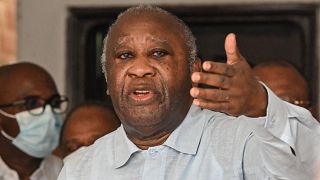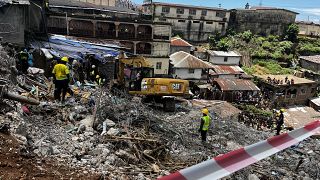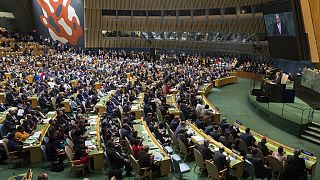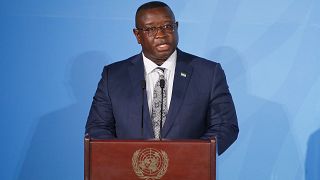Sierra Leone
The streets of Sierra Leone's capital were quiet on Wednesday, a day after President Julius Maada Bio was sworn in for a second term following an election his main rival slammed as "not credible."
Many people in central Freetown said they were relieved at the peaceful atmosphere as they went about their business at the start of Muslim festival of Eid, a public holiday.
Some women were selling food at market and commercial drivers of motorcycles and tuk-tuks were out in rain-soaked streets scouting for customers.
"I'm happy, not even because of the result, but I'm happy with the way everything came and went, because our expectations were really high that it was going to be like a catastrophe", said Amanda, 40, a hotel employee who did not want to give her last name.
TRENDING
Trevor Phillips: Meghan had to learn to be black when she became royal.
"(...) We can have the votes but if we don't have the peace it doesn't make a difference."
"Everyone is cool, everyone is doing well, everyone is happy. Everyone is going on with its normal business," said Abu Kailesie, a 24-year-old student and Bio supporter. "We are OK."
But Alpha Kaloko, a 20-year-old bike rider, said, "I´m not happy about these results, because I think this election is not right. It´s not fair... We need changes."
Bio, 59, who leads the Sierra Leone People's Party (SLPP), was sworn in at State House on Tuesday immediately after the Electoral Commission announced he had narrowly won outright victory in the first round of voting, with 56.17 percent of the ballot.
Presidential candidates need 55 percent of the vote in the first round to avoid a run-off.
Since the end of Sierra Leone's 1991-2002 civil war, no incumbent has failed to secure a victory in the first round.
Sierra Leone has a two-term presidential limit.
- Tense rematch -
The vote on Saturday was a rematch of a 2018 race that saw Bio, a former coup leader who campaigned on progressive policies, edge out Samura Kamara of the All People's Congress (APC).
But he took the helm just before the West African state was pummelled by the Covid-19 pandemic, followed by crippling levels of inflation.
EU observers denounced violence by security forces at the APC headquarters in Freetown on Sunday night, in what the police said was an effort to disperse opposition supporters, which left one woman dead.
Kamara, an ex-minister and economist, does not appear to have conceded defeat.
"I categorically reject the outcome so announced by the electoral commission," the candidate -- who won 41.16 percent of the vote, according to the Electoral Commission -- said on Twitter on Tuesday evening.
He has not given a speech since the results were announced. But shortly before the announcement of results, he denounced a "total lack of transparency and accountability" by the election overseer.
National Election Watch, a coalition of civil society organisations, issued a statement late Tuesday pointing to alleged irregularities in the electoral commission's data.
It said that, based on its own calculations, turnout was between 75.4 and 79 percent, not 83 percent as the electoral commission announced.
It also said that Bio should have received between 47.7 and 53.1 percent of the vote, while Kamara should have received between 43.8 and 49.2 percent.
Cameron Hume, a former US ambassador who headed an observation mission by the Carter Center, told AFP on Wednesday that there had been some flaws in the process.
"The voting seemed to take place in a credible manner," Hume said.
"But when it came to the delivery of ballots and the opening of ballot boxes at tabulation centres, there were numerous incidents where we saw a break in the chain of credibility."











00:58
Somaliland opposition leader wins presidential poll
01:10
Voters head to polls in Somaliland as leaders hope for global recognition
01:11
Chad's electoral body disqualifies senior ruling party official
Go to video
Ugandans detained for insulting President Museveni and family on TikTok
01:44
Mauritius heads to the polls in wake of wiretapping scandal
Go to video
Why Mozambique's election has sparked weeks of protests and a violent crackdown by police